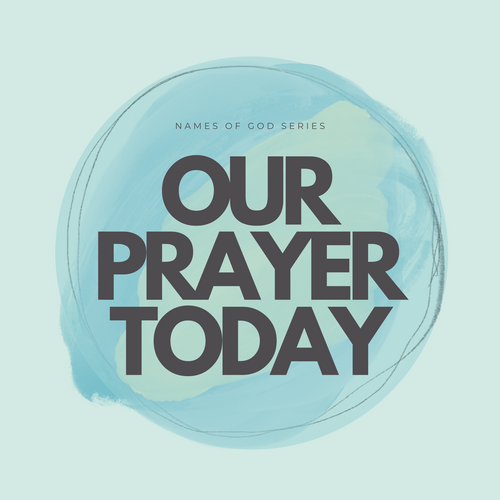God created us so that He could relate to us on the deepest level. He wants to know us and to be known by us. This has been the goal of God’s heart since the creation of mankind when He used to walk with Adam and Eve in the cool of the day. He longs to dwell with us, to tabernacle with us, to be close to us. His invitation to us is to abide or dwell with Him. This is why Jesus who is called Immanuel, God with us, came to earth. He longed to gather his children like a hen gathers her chicks under her wings, but they were unwilling.
Our final Hebrew name for God, Jehovah Shammah, touches on this concept of the Lord drawing near to be in relationship with us. This name is the last Hebrew name for God given to us in the Old Testament in Ezekiel 48:35. I think that is significant because the meaning of this name leaves us with solid hope for the future.
Jehovah Shammah means I Am There. Jehovah is the name for God that speaks of His existence. He was, He is, He will be. He stands outside of time. He keeps His covenants, the great I Am. Shammah means there, as in a specific location. The root of Shammah is similar to the root of the Hebrew word for tabernacle, dwell, abide.
Jehovah Shammah has to do with the presence of Jehovah. When God makes His indwelling presence known to man He does so with a literal shining forth of His glory. This visible presence is sometimes called the shekinah glory of God. Shekinah is not a word found in the Bible but it is a Hebrew word that describes something that is seen in the Bible. The shekinah glory is usually seen as an intensely bright white shining cloud or sometimes it is visible in the form of fire.
There are several times in the Scripture when the shekinah glory was visible on the earth, I want to consider a few of these times.
In Genesis 15 God cut a covenant with Abram. It came about when the sun had set that it was very dark and behold there appeared a smoking oven and a flaming torch which passed between these pieces. Genesis 15:17.
In Exodus 3 God appeared to Moses in a burning bush. And the angel of the Lord appeared to him in a blazing fire from the midst of a bush and he looked and behold the bush was burning with fire yet the bush was not consumed. Exodus 3:2
As the Israelites departed Egypt they were led by the presence of the Lord, The Lord was going before them in a pillar of cloud by day to lead them on the way and in a pillar of fire by night to give them light. Exodus 13:21
When the Lord gave the Ten Commandments Mount Sinai was on fire with the presence of the Lord. Later when Moses completed the Tabernacle something incredible happened. Then the cloud covered the tent of meeting and the glory of the Lord filled the tabernacle. Moses was not able to enter the tent of meeting because the cloud had settled on it and the glory of the Lord filled the tabernacle. Exodus 40:34-35
Throughout all the journeys of the Israelites during the forty years in the wilderness when the cloud moved from over the tabernacle, the Israelites set out following it. When it stopped, they stopped. God literally guided the Israelites with His presence. It was a sign of His favor. It distinguished believers from other people.
Once the Israelites were in the Promised Land, several generations later Solomon built and dedicated the temple, a permanent dwelling for the presence of the Lord in Jerusalem. Now when Solomon had finished praying fire came down from heaven and consumed the burnt offering and the sacrifices and the glory of the Lord filled the House. All the men of Israel seeing the fire come down and the glory of the Lord upon the house, bowed down on the pavement with their faces to the ground, and they worshiped and gave praise to the Lord, saying, “Truly He is good, truly His lovingkindness is everlasting.” II Chronicles 7:1,3
Can you imagine what that scene must have been like? It seems that the shekinah glory remained over the temple for hundreds of years. Think of a traveler arriving in Jerusalem and seeing the temple mount from afar. If you approached the city by day you would see a pillar of cloud reaching into the heavens yet hovering over the temple and by night that pillar of cloud turned into a pillar of fire. You would know that this place is different from all others, it is marked by the presence of the Lord. You can see why this outward showing forth of God’s glory brought a very appropriate response, worship.
But as the years went by the people didn’t always respond to this shining forth presence with awe, reverence and respect. They began to be cavalier about the Lord’s presence. Perhaps they took is for granted. They treated it lightly. They began to compromise the word of God and to ignore His commandments. They didn’t heed the warnings of the prophets who said devastation would come to the temple and Jerusalem if they continued on their downward path of sin.
By the time the prophet Ezekiel came along the situation was dire, it had degenerated into gross sin and idolatry. The Lord gave Ezekiel a vision of what was going on within the temple compound. Ezekiel saw for himself the abominations that were being committed on the property, the gross idolatry and unspeakable acts. As a result, Ezekiel saw that the shekinah glory was slowly retreating from the temple to the outer courts, then to the eastern gate and finally departed from Jerusalem.
This was such a sad time in the history of Israel. It is poignant. The Spirit of God retreated and then hovered as if He didn’t want to leave. The glory of the Lord went up from the midst of the city and stood over the mountain which is east of the city. Ezekiel 11:24.
Reluctantly He departed because of the egregious sin, indifference and rebellion of the people. Just as the prophets had warned, in 586 B.C. Jerusalem was decimated by the invading troops from Babylon; it was completely destroyed and the land was left desolate.
Talk about a low moment! The population was humiliated and taken from their homeland as captives to Babylon. These exiles never thought the temple could possibly be destroyed because of God’s favor, yet they were eye-witnesses to the horror of it. Its contents carried away as a mocking prize. They may have felt abandoned by God, forsaken and without hope. All alone. Rejected. Forgotten.
Then something happened. God gave Ezekiel one last prophecy for His people. This prophecy was different, this one brought encouraging words of hope and promise for the future. God has not forgotten His people, nor His covenant with them. A new glorious day is coming. The temple will be rebuilt and exceed its former glory. And that is not all, Ezekiel looked into the far distant future. The Lord took him in a vision to the eastern gate of the temple, and behold the glory of the God of Israel was coming from the way of the east. And His voice was like the sound of many waters; and the earth shone with His glory.…. And I fell on my face. And the glory of the Lord came into the house (the temple)…. And the Spirit lifted me up and brought me into the inner court and behold the glory of the Lord filled the house… He said to me, Son of man, this is the place of My throne and the place of the soles of My feet, where I will dwell among the sons of Israel forever. Ezekiel 43:1-7
The presence of the Lord will some day return to the temple in Jerusalem, never to depart again. Ezekiel’s words bring solid hope for the future. The day is coming when our time-out will be over. We will no longer be banished to a corner away from the manifest presence of God. Jehovah Himself will come to dwell with His people. Ezekiel saw the future, we are not forsaken, we have not been abandoned. He is with us. He is in our midst. God will draw near in intimacy. This is the goal of God, this is where history is going. This is God’s passion. He will wipe away every tear, there will be no more pain or death, all things will be made new. The hope Ezekiel saw is wrapped up in the last words of his book, Jehovah Shammah, the I Am There!

